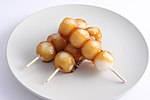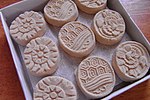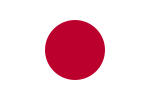Wagashi (和菓子, wa-gashi) is traditional Japanese confectionery, typically made using plant-based ingredients and with an emphasis on seasonality. Wagashi...
31 KB (3,364 words) - 13:01, 29 December 2024
List of Japanese desserts and sweets (section Wagashi)
as a wagashi. The raindrop cake, created in 2014, was developed by a wagashi shop as a derivative of shingen mochi and is recognized as a wagashi in Japan...
14 KB (1,150 words) - 15:56, 23 November 2024
Raindrop cake is a wagashi (Japanese confection) made of water and agar that resembles a large raindrop. It first became popular in Japan in 2014 and...
8 KB (807 words) - 11:35, 25 October 2024
Gionbō (category Wagashi)
Gionbō (祇園坊 or ぎおんぼう) is a wagashi (Japanese sweet). It resembles a dried persimmon, and is now made by filling gyūhi (a soft form of mochi) with bean...
3 KB (252 words) - 22:36, 13 November 2024
Taiyaki (category Wagashi)
song about taiyaki Wagashi, Japanese confectionery Harrison, Thom (19 April 2023). "Fish-shaped sweet street food". Wagashi UK. Wagashi UK. Retrieved 25...
5 KB (463 words) - 18:17, 26 December 2024
Warabimochi (category Wagashi)
Warabimochi (蕨餅, warabi-mochi) is a wagashi (Japanese confection) made from warabiko (bracken starch) and covered or dipped in kinako (sweet toasted soybean...
6 KB (565 words) - 12:18, 14 September 2024
Dango (category Wagashi)
paste, and other sweeteners. Generally, dango falls under the category of wagashi (Japanese confectionery), and is often served with green tea. It is eaten...
8 KB (823 words) - 22:36, 23 November 2024
Yōkan (category Wagashi)
Yōkan (羊羹) is a wagashi made of red bean paste, agar, and sugar. It is usually sold in a block form, and eaten in slices. There are two main types: neri...
6 KB (551 words) - 14:15, 16 December 2024
widely used in Japanese cooking, but is strongly associated with dango and wagashi. Dango, dumplings made from mochiko (rice flour), are commonly coated with...
5 KB (413 words) - 10:54, 15 October 2024
Gyūhi (category Wagashi)
Gyūhi (求肥) is a form of wagashi (traditional Japanese sweets). Gyūhi is a softer variety of mochi (餅), and both are made from either glutinous rice or...
2 KB (169 words) - 17:31, 28 August 2024
Momiji manjū is a type of wagashi that is baked. The confection is a buckwheat and rice cake shaped like a Japanese maple leaf, and is a local specialty...
3 KB (165 words) - 03:24, 11 November 2024
traditional sakadane liquid yeast. He then filled the bread with a bean paste wagashi and sold the resulting rolls as snacks. Anpan became popular not only because...
4 KB (434 words) - 02:18, 1 September 2024
Higashi (food) (category Wagashi)
confectionery') is a type of wagashi containing very little moisture, and thus keeps relatively longer than other kinds of wagashi. Higashi, in contrast to...
3 KB (282 words) - 17:24, 28 August 2024
Shrine, a holy place founded in 994. The restaurant produces and sells wagashi, traditional Japanese confections often served with tea, namely: aburi-mochi...
3 KB (251 words) - 14:13, 6 July 2024
Namagashi (category Wagashi)
Namagashi (生菓子) are a type of wagashi, which is a general term for traditional Japanese sweets and candies. Namagashi may contain fruit jellies, other...
2 KB (187 words) - 04:55, 10 April 2022
dish, alongside ramen and sushi. Traditional Japanese sweets are known as wagashi. Ingredients such as red bean paste and mochi are used. More modern-day...
201 KB (16,468 words) - 14:24, 1 January 2025
considered a specialty. Despite its foreign origins, it is considered a kind of wagashi, or traditional Japanese confectionery. To suit the tastes of Japanese...
10 KB (880 words) - 07:52, 21 December 2024
Anmitsu (category Wagashi)
Anmitsu (あんみつ, rarely 餡蜜) is a wagashi (Japanese dessert) that dates to the Meiji era. It is made of small cubes of agar jelly, a white translucent jelly...
2 KB (198 words) - 23:45, 21 March 2024
Monaka (category Wagashi)
landmarks, daruma, or other good luck symbols. Monaka is a type of dessert—wagashi—which is served with tea. There are still many very famous monaka specialty...
2 KB (190 words) - 20:40, 27 August 2024
Daifuku (category Wagashi)
Daifukumochi (大福餅), or daifuku (大福) (literally "great luck"), is a wagashi, a type of Japanese confection, consisting of a small round mochi stuffed with...
5 KB (487 words) - 07:27, 29 November 2024
Imagawayaki (category Wagashi)
Imagawayaki (今川焼き) is a wagashi (Japanese dessert) often found at Japanese festivals as well as outside Japan, in countries such as Taiwan and South Korea...
10 KB (913 words) - 01:52, 27 December 2024
Hanabiramochi (category Wagashi)
Hanabiramochi (葩餅) is a Japanese sweet (wagashi), usually eaten at the beginning of the year. Hanabiramochi are also served at the first tea ceremony...
3 KB (327 words) - 02:57, 23 April 2024
noodles, green tea ice cream, matcha lattes and a variety of Japanese wagashi confectionery. For this purpose, matcha made green by color additives instead...
45 KB (5,175 words) - 05:39, 30 December 2024
Hanabiramochi: a Japanese sweet (wagashi), usually eaten at the beginning of the year. Higashi: a type of wagashi, which is dry and contains very little...
47 KB (5,042 words) - 15:39, 9 November 2024
Amanattō (category Wagashi)
Yasubei during the Bunkyū years (1861–1863) in the Edo period. He opened a wagashi store in Tokyo, which he named for his childhood name: Eitaro. This store...
2 KB (164 words) - 20:48, 21 December 2024
Mizuame (category Wagashi)
liquid, it is made by converting starch to sugars. Mizuame is added to wagashi to give them a sheen, eaten in ways similar to honey, and can be a main...
3 KB (230 words) - 13:03, 29 December 2024
ingredient in many Japanese sweets. It is one of the ingredients used in making wagashi, and is eaten with kuzumochi, fruit, ice cream, and other confectionery...
2 KB (108 words) - 10:28, 15 October 2024
Dorayaki (category Wagashi)
Dorayaki Alternative names Mikasa Type Wagashi pancake Place of origin Japan Main ingredients Castella, red bean paste or sweet azuki bean paste Media:...
7 KB (647 words) - 15:02, 11 December 2024
with kuzuko) Goma-dofu (kuzuko pudding with sesame paste) Examples of wagashi (Japanese desserts) with kuzuko: Kuzumochi cakes Kuzukiri (clear cake of...
3 KB (201 words) - 10:34, 15 October 2024
Sakuramochi (category Wagashi)
Sakuramochi (桜餅) is a Japanese confection (wagashi) consisting of sweet, pink-colored rice cake (mochi) with red bean paste (anko) filling, wrapped in...
6 KB (527 words) - 15:06, 16 April 2024





























